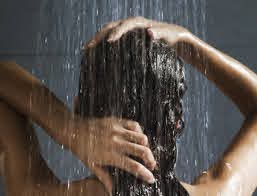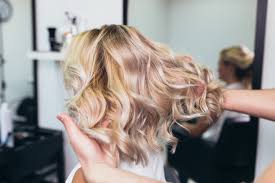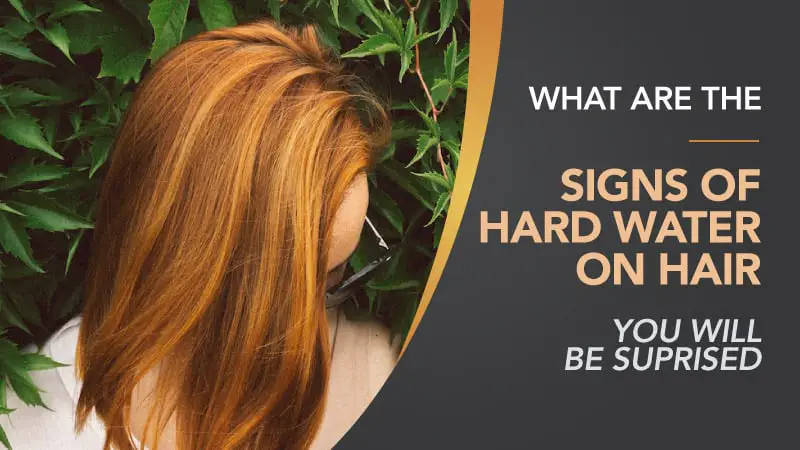What are the Signs of Hard Water On Hair ? (You will be Suprised)
Hard water is the number one enemy of hair, showers, and home appliances across the world.
It clogs showerheads, ruins kettles, and even has the ability to destroy steam cleaners. But what if I told you that this monstrosity can also negatively impact your hair?
It’s true, nothing is completely safe from hard water. But how can you tell if your hair is being affected by hard water? What are the signs?
We’re here to put your mind at ease and answer your questions - giving you a better idea of how to spot when hard water strikes.
Signs of Hard Water on Hair
If you are afraid that hard water is present in your home, there are a few signs you can look out for in your hair. These include:
- Dry and itchy scalp
- Split ends
- Flat hair
- Increased dandruff
- Thinning hair
- Hair loss (rare and disputed)
- Stunted hair growth
- Frizzy and dull hair
Why does hard water do this to our hair, and can it really cause hair loss? For the latter, we actually have a dedicated guide to the effects of hard water on hair loss, but there is an easy explanation for why hard water has such a negative impact on our hair.
Hard water contains various minerals such as magnesium and calcium. Over time, these minerals coat the hair and build up - causing the strands to become heavier and weighing down your hair so that it appears flat and dull.
Even shampoo has no effect on these deposits because they are caused by the water, and the only way to permanently fix the issue is to get a water softener for your showerhead.

You can also treat your hair with vinegar and citrus washes that help dissolve the minerals in your hair.
But where does thinning hair come in? The build-up on your scalp leads to you becoming itchier due to dandruff, which then causes you to scatch more.
The scratching damages the hair follicles over time and hair becomes thinner because it starts falling out of the damaged follicles.
Tips for Washing Hair in Hard Water
If you’re experiencing hard water and aren’t able to fix it any time soon, here are a few quick tips for washing it effectively in a bid to reduce minerals and promote healthier hair.
- Vinegar/Citrus Rinse
- Clarifying Shampoo
- Conditioning Regularly
The vinegar and citrus washes are great for tackling build up so that you can break down all those deposits and strip your hair back to a healthier and more natural state.

These washes are also rich in vitamins and minerals to enrich the hair and nourish it.
Clarifying shampoo and regular conditioning help to moisturise your hair and give it the strength it needs to recover and repair when washing your hair in hard water.
It strengthens the follicles and any holes caused by hard water minerals. Additionally, it keeps the scalp clean to prevent dandruff and itchiness.
These might be very simple maintenance tips, but they really do work well when bringing your hair back to a healthier state after being exposed to hard water for a prolonged period of time.
Frequently Asked Questions

How does hard water affect hair colour?
Had water can affect hair colour by causing fading. Additionally, those with blonde colouring may end up with a green or orange tint.
This is why having a water filter installed on the showerhead is a great option, as it helps you keep the colour strong for longer.
Does hard water cause grey hair?
No, hard water does not cause grey hair. However, if you have coloured your hair to hide the grey then you may find that it fades faster and causes your natural hair to reappear.


Can hard water make your hair brassy?
Yes, hard water can make your hair brassy. The combination of mineral deposits and large quantities of iron causes these brassy tones - namely due to iron being an oxidiser. This can impact both light and dark hair colours.

Final Thoughts
Watching out for the signs of hard water isn’t just good for your hair, but also the state of your home appliances. Limescale and mineral deposits can damage your hair as well as your kettle, showerhead, and even the taps.
While hard water is fairly easy to fix through the use of water softeners and the like, it can still be frustrating to encounter.
Keep an eye on the condition of your hair, and take action as soon as you notice the signs so that you can protect it from potential damage.
How do you deal with hard water in your home? We love hearing more about your tips and tricks, so make sure you leave us a message in the comments below.

